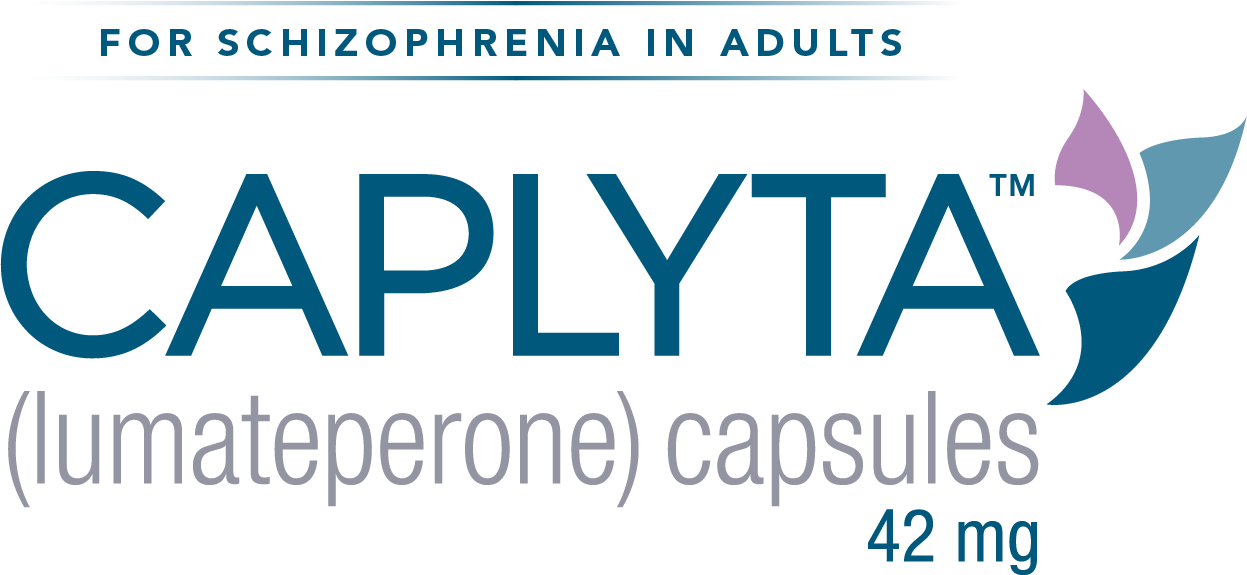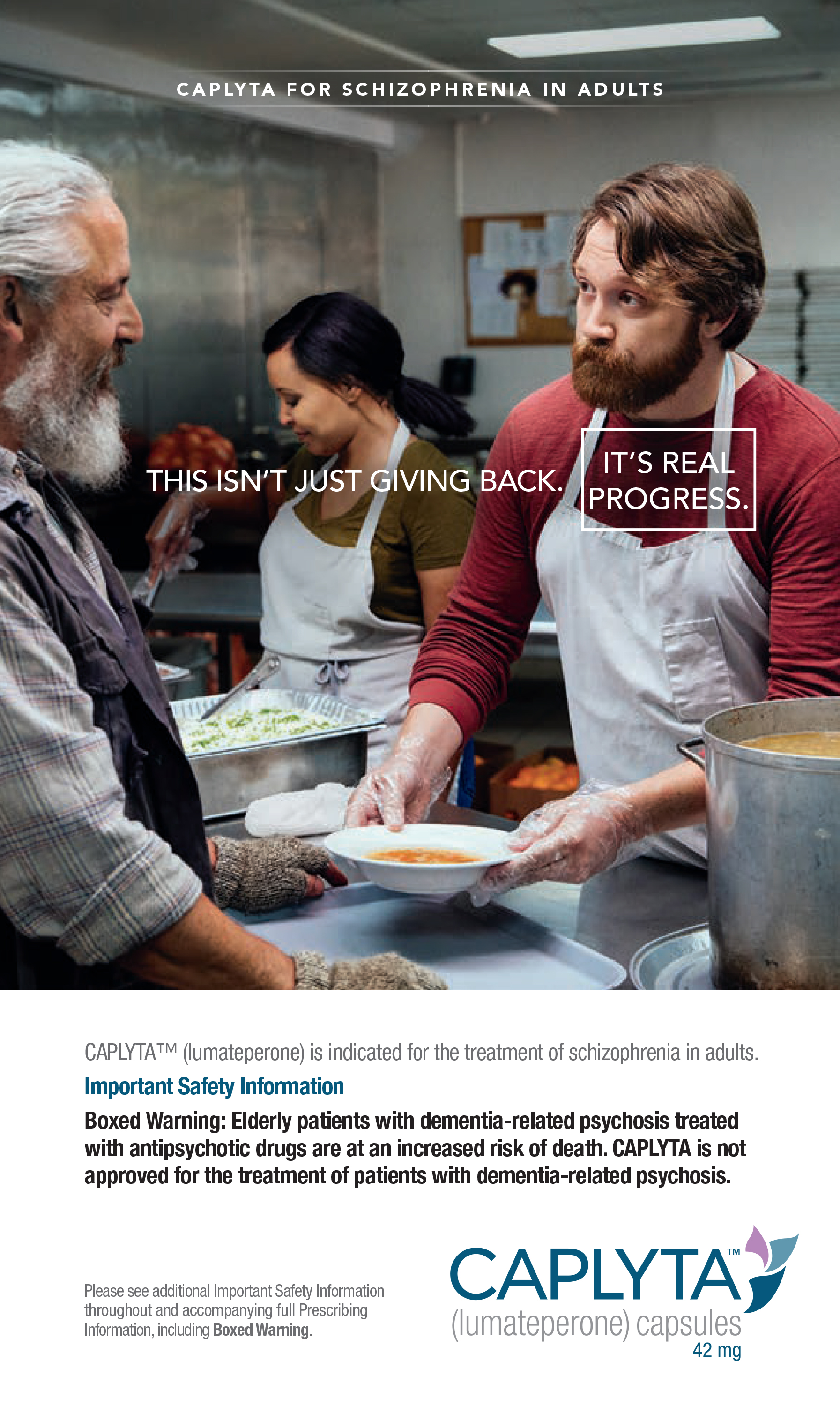About Us

Important Safety Information
Boxed Warning: Elderly patients with dementia-related psychosis treated with antipsychotic drugs are at an increased risk of death. CAPLYTA is not approved for the treatment of patients with dementia-related psychosis.
Contraindications: CAPLYTA is contraindicated in patients with known hypersensitivity to lumateperone or any components of CAPLYTA. Reactions have included pruritus, rash (e.g. allergic dermatitis, papular rash, and generalized rash), and urticaria.
Please see additional Important Safety Information below.
Contact Us
Would you like to request samples or to speak to a representative? To schedule a meeting or request a sample, call today at 888-252-4824
An Expert Discussion on Schizophrenia
Resources
Please see full Prescribing Information, including Boxed Warning
Register for the national webcast educational program
Sign up to download the Lieberman Study e-Print*
*The linked article pertains to one of the clinical trials that served as the basis for the approval of CAPLYTA. The article contains information that is not consistent with the FDA-approved labeling. CAPLYTA contains 42 mg of lumateperone (equivalent to 60 mg of lumateperone tosylate).
Resources

Resources
Resources

Important Safety Information (continued)
Warnings & Precautions: Antipsychotic drugs have been reported to cause:
- Cerebrovascular Adverse Reactions in Elderly Patients with Dementia-Related Psychosis, including stroke and transient ischemic attack. See Boxed Warning above.
- Neuroleptic Malignant Syndrome, which is a potentially fatal reaction. Signs and symptoms include: hyperpyrexia, muscle rigidity, delirium, autonomic instability, elevated creatinine phosphokinase, myoglobinuria (and/or rhabdomyolysis), and acute renal failure. Manage with immediate discontinuation of CAPLYTA and provide intensive symptomatic treatment and monitoring.
- Tardive Dyskinesia, a syndrome of potentially irreversible, dyskinetic, and involuntary movements which may increase as the duration of treatment and total cumulative dose increases. The syndrome can develop after a relatively brief treatment period, even at low doses. It may also occur after discontinuation of treatment. Given these considerations, CAPLYTA should be prescribed in a manner most likely to reduce the risk of tardive dyskinesia. Discontinue CAPLYTA if clinically appropriate.
- Metabolic Changes, including hyperglycemia, diabetes mellitus, dyslipidemia, and weight gain. Hyperglycemia, in some cases extreme and associated with ketoacidosis, hyperosmolar coma or death, has been reported in patients treated with antipsychotics. Measure weight and assess fasting plasma glucose and lipids when initiating CAPLYTA and monitor periodically during long-term treatment.
- Leukopenia, Neutropenia, and Agranulocytosis (including fatal cases). Perform complete blood counts in patients with pre-existing low white blood cell count (WBC) or history of leukopenia or neutropenia. Discontinue CAPLYTA if clinically significant decline in WBC occurs in absence of other causative factors.
- Orthostatic Hypotension and Syncope. Monitor heart rate and blood pressure and warn patients with known cardiovascular or cerebrovascular disease. Orthostatic vital signs should be monitored in patients who are vulnerable to hypotension.
- Falls. CAPLYTA may cause somnolence, postural hypotension, and motor and/or sensory instability, which may lead to falls and, consequently, fractures and other injuries. Assess patients for risk when using CAPLYTA.
- Seizures. Use CAPLYTA cautiously in patients with a history of seizures or with conditions that lower seizure threshold.
- Potential for Cognitive and Motor Impairment. Advise patients to use caution when operating machinery or motor vehicles until they know how CAPLYTA affects them.
- Body Temperature Dysregulation. Use CAPLYTA with caution in patients who may experience conditions that may increase core body temperature such as strenuous exercise, extreme heat, dehydration, or concomitant anticholinergics.
- Dysphagia. Use CAPLYTA with caution in patients at risk for aspiration.
Drug Interactions: Avoid concomitant use with CYP3A4 inducers, moderate or strong CYP3A4 inhibitors and UGT inhibitors.
Special Populations: Neonates exposed to antipsychotic drugs during the third trimester of pregnancy are at risk for extrapyramidal and/or withdrawal symptoms following delivery. Breastfeeding is not recommended. Avoid use in patients with moderate or severe hepatic impairment.
Adverse Reactions: The most common adverse reactions in clinical trials with CAPLYTA vs. placebo were somnolence/sedation (24% vs. 10%) and dry mouth (6% vs. 2%).
CAPLYTA and LYTAlink are trademarks of Intra-Cellular Therapies, Inc.
© 2020 Intra-Cellular Therapies, Inc. All rights reserved. 06/2020 US-CAP-2000351
| Access Date | Quiz Result | Score | Actions |
|---|



 are registered in the U.S. Patent and Trademark Office as trademarks of the American Psychiatric Nurses Association.
are registered in the U.S. Patent and Trademark Office as trademarks of the American Psychiatric Nurses Association.